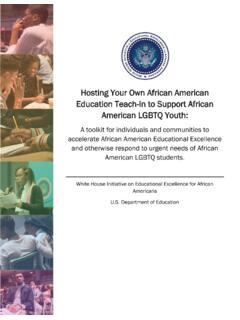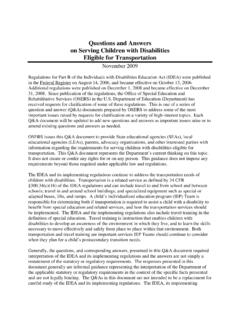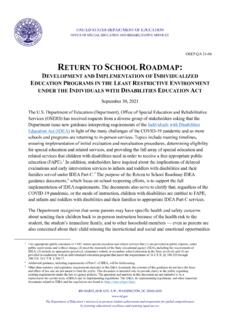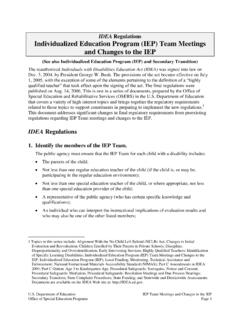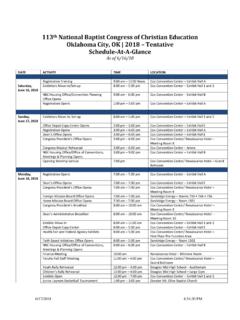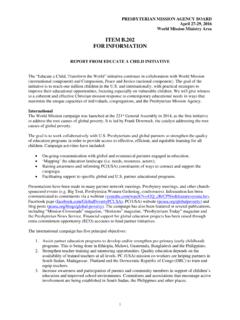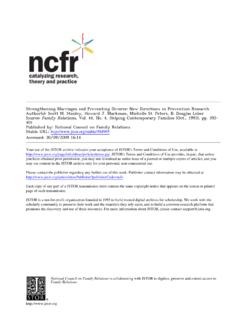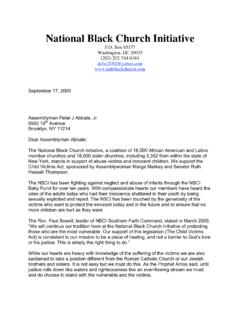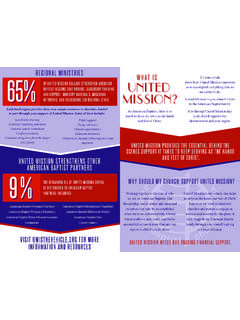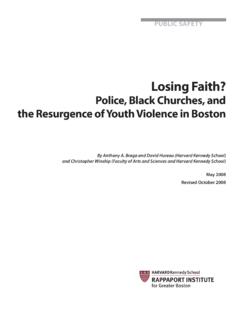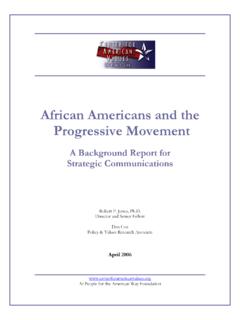Transcription of Faith-Based and Community Leaders
1 Faith-Based and Community Leaders Early Learning Toolkit A Comprehensive Guide for Faith-Based and Community Leaders Committed to the Lifelong Success of Children and Families This document contains materials that are provided for the user s convenience. The opinions expressed in any of the materials referenced in this document do not necessarily reflect the positions or policies of the Department of Education (Department) and should not be construed as an endorsement of any kind). The Department does not control or guarantee the accuracy, relevance, timeliness, or completeness of any outside information included in these materials. Faith-Based and Community Leaders Early Learning Toolkit Table of Contents Letter to Faith-Based and Community Leaders 3 Introduction 4 Section 1: Learning Begins at Home Partner with Families to Build Lifelong Learners 5 Section 1a: Brain Development 5 Section 1b: Resources on Brain Development 6 Section 1c: Supporting Brain Development 6 Section 1d: Educate Parents and Caregivers on High-Quality Early Learning 7 Section 2: Empower Families to Advocate for Children s Education 9 Section 2a: Family Engagement Resources 9 Section 2b: Family Engagement Activities 10 Section 2c: Resources for Parents of Children with Special Needs 11 Section 3: Best Practices for Uplifting the Community through Academic Enrichment, Health and Wellness, and School Partnership 13 Section 3a.
2 Getting Started: Early Learning Community Needs Assessments 14 Section 3b: Health and Safety Resources 15 Section 3c: Tools to Assess Early Learning Environments 16 Section 3d: High-Quality Workforce 18 Section 3e: Frequently Asked Questions: Early Care and Education Funding 19 Section 4: Call to Action: Purging the Preschool to Prison Pipeline 22 Section 4a: Data and Research 22 Section 4b: Tools to Make A Difference 23 About Early Learning at the Department of Education 25 About the White House Initiative on Educational Excellence for African Americans 26 About the Center for Faith-Based and Neighborhood Partnerships 27 About National black Child Development Institute (NBCDI) 28 Appendices: A: Early Learning Community Needs Assessment Guide 29 B: Early Learning Activities 34 C: Parent Checklist 36 D: Working with Parents to Understand Parenting Styles 37 E: Parent Involvement Continuum 39 F: 50 Ways to Get Families Engaged 40 G: Disability Terminology Chart 42 H: Other Early Learning Efforts 44 References 45 Dear Faith-Based and Community Leaders , We are inspired by you and your unrelenting commitment to strengthening our communities.
3 We understand the importance of the services you provide, and we are pleased to provide a toolkit to help support you and your organization s commitment to ensuring that young children can thrive academically, emotionally, socially, and physically. The White House Initiative on Educational Excellence for African Americans (Initiative) has partnered with the Department of Education s Center for Faith-Based and Neighborhood Partnerships and National black Child Development Institute (NBCDI) to develop this toolkit for Faith-Based and Community Leaders . This toolkit will assist you and your Community in developing, implementing, and sharing high-quality early learning and educational opportunities for children and families. Early learning opportunities begin long before Kindergarten. In fact, children whose educational needs are poorly met in the first five years of life fall behind in school readiness and face many challenges in school.
4 We believe that by enhancing investments in high-quality early care and educational programs for infants, toddlers, and preschoolers in your Community , our children are better prepared for academic success and are provided with strong foundations upon which they can thrive emotionally and spiritually. This toolkit is designed to support you in expanding or initiating early learning programming for young children and their families. We developed this toolkit using research- based evidence that stresses the significance of high-quality early learning. We identify practices from Faith-Based and Community organizations across the Nation and include tips, best practices, and useful links. We grounded such practices in holistic approaches that are designed to uplift children, families, and your Community . Consistent with the Executive Order, signed by President Obama on June 26, 2012, that established the White House Initiative on Educational Excellence for African Americans, this toolkit focuses on information to help young African American children, but we believe that the information will be very useful in helping all young children.
5 Please be sure to share pictures, video, and recommendations from your early learning programs. We are eager to hear about your work. Thank you in advance for responding to President Obama s call to improve educational outcomes for young African American children. Sincerely, David Johns David Johns, Executive Director White House Initiative on Educational Excellence for African Americans Tobeka Green Tobeka Green, President and CEO National black Child Development Institute (NBCDI) Brenda Girton-Mitchell Reverend Brenda Girton-Mitchell, Director Center for Faith-Based & Neighborhood Partnerships US Department of Education 4 Section 1: Introduction Faith-Based and other Community organizations are an important force in uplifting communities and keeping families strong. These organizations are uniquely suited to bring together residents and local Leaders to address pressing challenges and provide information to individuals that can be used to improve and strengthen Faith-Based and Community Leaders have provided education and refuge.
6 For example, Atlanta s Big Bethel church founded one of the first historically black colleges in the United States, Morris Brown College, which is still organized for and by African Americans Faith-Based and neighborhood Leaders continue to hold a prominent place in communities, including African American communities, because they support the interests of their communities and families. For example, from slavery to Civil Rights, black Faith-Based and Community Leaders have played an important part in advocating for social movements and Community This toolkit is designed to support Faith-Based and Community Leaders and communities in fostering the learning and development of African American children and families, from the start. High-quality early learning programs provide infants, toddlers, and preschoolers with stimulating and responsive environments that enhance their cognitive, language, physical, and social-emotional development.
7 Specifically, this toolkit is designed to: Highlight the important role of Faith-Based and Community Leaders and their organizations in educating African American children and families; Identify innovative approaches that Faith-Based and Community organizations are taking to support education and learning outcomes for young African American children from underserved neighborhoods; Connect Faith-Based and Community Leaders with evidence- based practices, resources, action steps, and ideas to launch and enhance initiatives that support educational opportunities for African American children, that foster their personal and academic success; Empower families to be advocates for their child s education and well-being; Emphasize the connection between educational success and overall health and wellness of children; Recognize that Faith-Based and Community organizations are uniquely suited to take a holistic approach to uplifting children and families; Identify grants and state and federal funding resources available to Faith-Based and Community organizations for academic enrichment programs; and Acknowledge early learning initiatives at the federal level and highlight opportunities for Faith-Based and Community organizations to be a voice for African American children, as school systems are implementing changes.
8 5 Section 1: Learning Begins at Home: Partnering with Families to Build Lifelong Learners faith based and Community organizations are a vital source of support for many families. Parents and caregivers often look to Faith-Based and Community Leaders and organizations to share moral values, traditions, and culture while supporting educational excellence. In this section of the toolkit, we highlight two key ways that Faith-Based and Community organizations can support families in: 1) ensuring a solid foundation for children s learning and development and 2) empowering family members to be engaged in their child s academic success. _____ Children develop in an environment of relationships that begin in the home and include extended family members, early care and education providers, and members of the Community . iv _____ Section 1a: Brain Development The first few years of life are when a child s brain develops most rapidly, making this period the most critical time for parents and caregivers to help shape their child s future success.
9 Positive early interactions between the child and his/her parents or caregivers are the foundation for social-emotional and cognitive development. Children identify with, imitate, and begin to internalize values, expressions, and approaches to problem-solving from their caregivers. Caregiver-child interactions and environment shape brain growth and capacity. A key to promoting early brain development with parents and caregivers is letting them know that they already possess many of the skills to develop their child s brain. A child s brain development is positively affected by early language, math, and science experiences, such as listening, talking, reading, singing, writing, counting, and exploring his/her world. These interactive activities work to help shape future learning. Parents and caregivers promote increased language development when they are intentional about the amount and quality of speech used with their child.
10 Families can take advantage of opportunities for learning through everyday activities and routines, such as playtime, diapering, grocery shopping, and feeding time. Communication and language development are two-way processes: 1) the child has opportunities to practice and refine language skills, and 2) the parents and caregivers are able to monitor their child s language Another important component to early brain development is ensuring that the social and emotional needs of children are met. Secure and safe attachments between children and their parents and caregivers provide a strong foundation for children to develop socially, emotionally, and academically within their A secure attachment with a parent or caregiver builds trust and lets a child know he/she is safe to explore and learn more about the world around him/her, jumpstarting the development and learning process.
